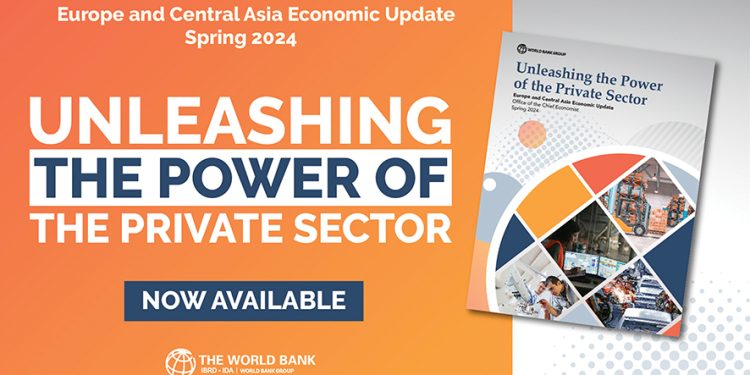Economic activity in the emerging and developing economies of the Europe and Central Asia region is likely to slow this year as a weaker global economy, tight monetary policy, slowdown in China and lower commodity prices weigh on the region’s growth outlook, says the World Bank’s Economic Update for the region, released today.
Regional growth is likely to slow to 2.8% this year, following substantial strengthening to 3.3% in 2023 as the economies of both Russia and war-hit Ukraine returned to growth and because of a more robust recovery in Central Asia. Regional output growth is likely to remain broadly unchanged in 2025.
Headwinds to the outlook are multiple. A slower-than-expected recovery in key trading partners, especially in the euro area, restrictive monetary policies, and an exacerbation of geopolitical developments could further dampen growth across the region.
“Countries of Europe and Central Asia continue to confront multiple crises, exacerbated by a challenging global growth environment,” said Antonella Bassani, World Bank Vice President for the Europe and Central Asia region. “Reviving productivity growth by stimulating business dynamism and improving resilience against the risks from climate change can help protect the region’s people and accelerate economic growth.”
Sluggish growth will further delay the region’s recovery from recent shocks, including Russia’s invasion of Ukraine, which remains ongoing, the pandemic, and the 2022 cost-of-living crisis.
Inflation has fallen faster than expected in the emerging markets and developing economies (EMDEs) of Europe and Central Asia, largely due to steep declines in global energy and food prices. The median annual consumer price inflation in the region fell to 4.2% by February 2024 from 15% at the start of 2023. Nevertheless, the 2022 cost-of-living crisis continues to affect households despite increases in real incomes last year.
In Ukraine, the pace of recovery is projected to slow to 3.2% this year from 4.8% in 2023, reflecting a smaller harvest and persistent labor shortage. The country’s economic outlook remains conditional on donor support and the duration of Russia’s invasion. According to recent estimates by the World Bank and partner institutions, the cost of reconstruction and recovery in Ukraine has grown to $486 billion, which is more than two times the size of Ukraine’s pre-war economy in 2021.
Growth in Türkiye is also likely to weaken to 3% this year – its lowest since 2009, except for the pandemic-affected years – as macroeconomic consolidation efforts are expected to restrain domestic demand. Subdued global oil prices will dampen prospects across Central Asia, with growth slowing to 4.1% this year from an estimated 5.5% in 2023.
Growth in the South Caucasus is projected to ease from 3.8 percent in 2023 to 3.5 percent in 2024, as growth decelerates in key trading partners, including the European Union.
“Against this backdrop, economic growth in Georgia is forecasted at 5.2 percent in 2024; remaining above the regional average,” Roland Price, the Regional Director of the World Bank in the South Caucasus, noted in a video address. “Despite a slowdown in money transfer inflows, robust investment and tourism is expected to continue supporting growth, while inflation is expected to converge to its 3 percent target by end-2024, while monetary policy will continue to ease gradually.
“The report also includes a special focus chapter on unleashing the power of the private sector. It notes that economic development in the region has been a story of transition from planned to market economies, and the emergence of private initiative has been the main driver of growth and prosperity.
“While Georgia successfully accomplished first-generation market transition reforms, the accession path to the EU brings unique opportunities to further strengthen institutions and regulatory enforcement and boost integration into international markets.
“For Georgia, as for other countries in the region, boosting business dynamism will require addressing several challenges, including upgrading the competition environment, reducing state involvement in the economy, improving the quality of education, and strengthening the availability of finance for firms,” Price concluded.
In less than three decades, 12 of the countries in the region joined the European Union (EU). The transition of these countries to EU-integrated market economies with robust institutions and production structures illustrates the success of the deep reforms of some of the countries, which have also achieved high-income status.
“The private sector in several countries in the region faces barriers, which hamper its ability to expand and innovate,” said Ivailo Izvorski, World Bank Chief Economist for Europe and Central Asia region. “Boosting business dynamism will require addressing several challenges, including upgrading the competition environment, reducing state involvement in the economy, improving the quality of education, and strengthening the availability of finance for firms.”
Efforts to foster competition and free markets should focus on reducing barriers to entry and facilitate exit for unproductive firms. The substantial presence of state-owned enterprises is also a major constraint to levelling the playing field for private enterprises.
Private firms are also faced with an inadequately educated workforce and large skills gaps, which are major constraints to growth. High emigration rates of young and skilled workers do not help in the short term. A better educated workforce is associated with higher productivity and can lead to more innovation.
Bank lending to the private sector is relatively low and has not increased in the past decade. The lending also tends to be more short-term. To improve productivity growth and innovation, firms need access to long-term finance.














